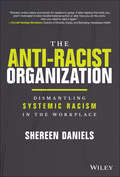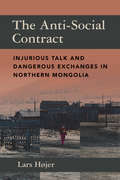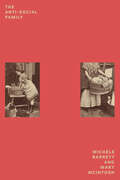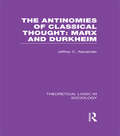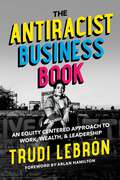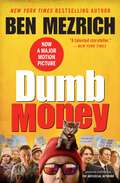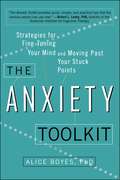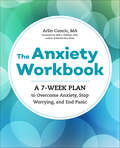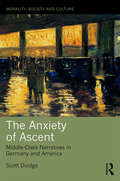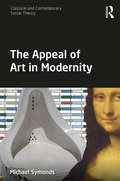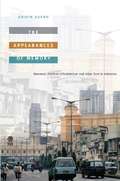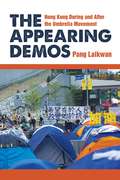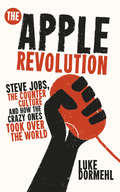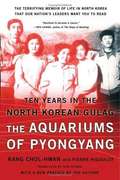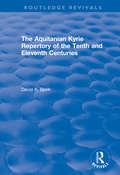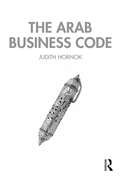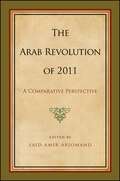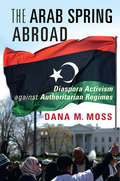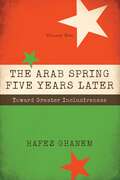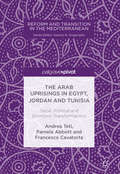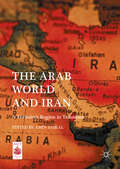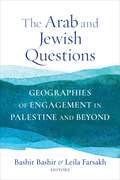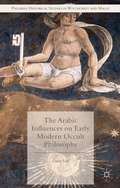- Table View
- List View
The Anti-Racist Organization: Dismantling Systemic Racism in the Workplace
by Shereen DanielsTackle systemic racism in the workplace with practical strategies In The Anti-Racist Organization: Dismantling Systemic Racism in the Workplace, HR strategist Shereen Daniels delivers an incisive and honest discussion of how business leaders can change workplace practices to create a more anti-racist and equitable environment. The author draws on her personal and client-facing experience, historical fact, legal proceedings, HR insights, and quantitative analysis to equip readers with the knowledge and tools they need to transform their companies. Daniels also looks at: The role of executive leaders and how to push past discomfort to credibly and authentically lead change Strategies for recognising the problem of systemic racism and implementing impactful solutions Why it’s important to empower colleagues to be pioneers of change and how to do that Explanations of why diversity and inclusion initiatives haven’t yet solved the problem Ways language can either be a weapon to perpetuate systemic racism or a tool to dismantle An indispensable exploration of how systemic racism is engrained into business structures, policies, and procedures, The Anti-Racist Organization: Dismantling Systemic Racism in the Workplace belongs in the libraries of all business leaders seeking to make their workplace more inclusive and equitable.
The Anti-Social Contract: Injurious Talk and Dangerous Exchanges in Northern Mongolia
by Lars HøjerSet in a remote district of villagers and nomadic pastoralists in the northernmost part of Mongolia, Højer introduces a local world, where social relationships are cast in witchcraft-like idioms of mistrust and suspicion. While the apparent social breakdown that followed the collapse of state socialism in Mongolia often implied a chaotic lack of social cohesion, this ethnography reveals an everyday universe where uncertain relations are as much internally cultivated in indigenous Mongolian perceptions of social relatedness, as it is externally confronted in postsocialist surroundings of unemployment and diminished social security.
The Anti-Social Family (Radical Thinkers)
by Michèle Barrett Mary McIntoshDespite much talk of its decline, the nuclear family persists as a structure central to contemporary society, a fact to be lamented, according to the ideas of Michèle Barrett and Mary McIntosh. The Anti-social Family dissects the network of household, kinship and sexual relations that constitute the family form in advanced capitalist societies to show how they reinforce conditions of inequality. This classic work explores the personal and social needs that the family promises to meet but more often denies, and proposes moral and political practices for more egalitarian caring alternatives.
The Antilles: Fragments of Epic Memory
by Derek WalcottDerek Walcott was awarded the Nobel Prize in Literature on December 10, 1992. His Nobel lecture is a stirring evocation of the multivalent wholeness of the culture of the Antilles, forged out of a violent history against a land- and seascape of immemorial dimensions. "Caribbean culture is not evolving but already shaped," writes Walcott. "Its proportions are not to be measured by the traveller or the exile, but by its own citizenry and architecture. " He finds the image of this culture in the city of Port of Spain, Trinidad, "mongrelized, polyglot, a ferment without a history, like heaven. " And watching a group of East Indian Trinidadians reenact the Hindu epic the Ramayana in the small village of Felicity, he meditates on the sacred celebration of joy, the rehearsal of collective memory, that is the very essence of human experience, beyond history. Walcott's lecture is a powerful re-envisioning of the themes that have energized and informed his poetry. "
The Antinomies of Classical Thought: Marx And Durkheim (Theoretical Logic in Sociology)
by Jeffrey C. AlexanderThis volume challenges prevailing understanding of the two great founders of sociological thought. In a detailed and systematic way the author demonstrates how Marx and Durkheim gradually developed the fundamental frameworks for sociological materialism and idealism. While most recent interpreters of Marx have placed alienation and subjectivity at the centre of his work, Professor Alexander suggests that it was the later Marx’s very emphasis on alienation that allowed him to avoid conceptualizing subjectivity altogether. In Durkheim’s case, by contrast, the author argues that such objectivist theorizing informed the early work alone, and he demonstrates that in his later writings Durkheim elaborated an idealist theory that used religious life as an analytical model for studying the institutions of secular society.
The Antiracist Business Book: An Equity Centered Approach to Work, Wealth, and Leadership
by Trudi LebronThe Antiracist Business Book is the first of its kind, as DEI business coach Trudi Lebrón offers business owners real-life lessons on how to build, reshape, and re-envision their work to support and repair the wealth of all people.
The Antisocial Network: The GameStop Short Squeeze and the Ragtag Group of Amateur Traders That Brought Wall Street to Its Knees
by Ben MezrichFrom one of our most innovative and celebrated authors, the definitive take on the wildest story of the year— the David-vs.-Goliath GameStop short squeeze, a tale of fortunes won and lost overnight that may end up changing Wall Street forever.Bestselling author Ben Mezrich offers a gripping, beat-by-beat account of how a loosely affiliate group of private investors and internet trolls on a subreddit called WallStreetBets took down one of the biggest hedge funds on Wall Street, firing the first shot in a revolution that threatens to upend the establishment.It&’s the story of financial titans like Gabe Plotkin of hedge fund Melvin Capital, one of the most respected and staid funds on the Street, billionaires like Elon Musk, Steve Cohen, Mark Cuban, Robinhood co-CEOs Vlad Tenev and Baiju Bhatt, and Ken Griffin of Citadel Securities. Over the course of four incredible days, each in their own way must reckon with a formidable force they barely understand, let alone saw coming: everyday men and women on WallStreetBets like nurse Kim Campbell, college student Jeremy Poe, and the enigmatic Keith &“RoaringKitty&” Gill, whose unfiltered livestream videos captivated a new generation of stock market enthusiasts.The unlikely focus of the battle: GameStop, a flailing brick-and-mortar dinosaur catering to teenagers and outsiders that had somehow held on as the world rapidly moved online. At first, WallStreetBets was a joke—a meme-filled, freewheeling place to share shoot-the-moon investment tips, laugh about big losses, and post diamond hand emojis. Until some members noticed an opportunity in GameStop—and rode a rocket ship to tens of millions of dollars in earnings overnight.In thrilling, pulse-pounding prose, THE ANTISOCIAL NETWORK offers a fascinating, never-before-seen glimpse at the outsize personalities, dizzying swings, corporate drama, and underestimated American heroes and heroines who captivated the nation during one of the most volatile weeks in financial history. It&’s the amazing story of what just happened—and where we go from here.
The Anxiety Toolkit: Strategies for Fine-Tuning Your Mind and Moving Past Your Stuck Points
by Alice BoyesDo you overthink before taking action? Are you prone to making negative predictions? Do you worry about the worst that could happen? Do you take negative feedback very hard? Are you self-critical? Does anything less than perfect performance feel like failure?If any of these issues resonate with you, you're probably suffering from some degree of anxiety, and you're not alone. The good news: while reducing your anxiety level to zero isn't possible or useful (anxiety can actually be helpful!), you can learn to successfully manage symptoms - such as excessive rumination, hesitation, fear of criticism and paralysing perfection.In The Anxiety Toolkit, Dr. Alice Boyes translates powerful, evidence-based tools used in therapy clinics into tips and tricks you can employ in everyday life. Whether you have an anxiety disorder, or are just anxiety-prone by nature, you'll discover how anxiety works, strategies to help you cope with common anxiety 'stuck' points and a confidence that - anxious or not - you have all the tools you need to succeed in life and work.From the Trade Paperback edition.
The Anxiety Workbook: A 7-Week Plan to Overcome Anxiety, Stop Worrying, and End Panic
by Arlin CuncicYou're just 7 weeks away from overcoming your anxiety Whether it takes the form of full-blown panic or chronic worry, anxiety can limit the potential of every aspect of your life. Regain control with help from The Anxiety Workbook, a simple, 7-week plan that gives you the tools you need to manage your anxiety so you can feel and function at your best again.You'll learn how to set clear goals, identify and change unhelpful thoughts, and practice new behaviors to diminish the power anxiety has over you. Each week explores a different topic, with cumulative lessons that offer a straightforward path to success. It's time to get free from the obstacles holding you back, break away from negative thought patterns, and alleviate your anxiety over the long term.This anxiety and phobia workbook includes:An easy pace—Take anxiety management at your own pace with exercises that challenge you and address your concerns without stressing you out.A proactive approach—Explore hands-on ways to relieve anxiety with simple, actionable checklists, writing exercises, activities, and more.An evidence-based method—Discover research-supported information and exercises based in cognitive behavioral therapy (CBT).Take the reins of your life back with The Anxiety Workbook.
The Anxiety of Ascent: Middle-Class Narratives in Germany and America (Morality, Society and Culture)
by Scott DoidgeThis intriguing book re-evaluates a narrative of cultural decline that developed in the wake of Max Weber’s The Protestant Ethic and the Spirit of Capitalism. For Weber, and a group of influential sociologists that followed, Western modernity is marked by growing disenchantment with the beliefs and values that had previously given a sense of structure and meaning to life. Despite its unparalleled material achievements, the modern West in this reading is suffering from a crisis of meaning and is no longer able to provide authoritative answers to the only really important question: ‘What shall we do and how shall we live?’ This book examines two influential responses to this question: the German bourgeois ideal of the late nineteenth century and the mid-twentieth century American celebration of the middle class. In each period, the exploration is guided by a close reading of a contemporary and retrospective text. For Germany, Gustav Freytag’s novel Debt and Credit (1855) is read against Thomas Mann’s Buddenbrooks (1901), and, for the US, the domestic comedy Father Knows Best (1954–1960) is read against the cable television drama Mad Men (2007–2015). The Anxiety of Ascent casts Weber’s narrative in a more optimistic light, pointing towards the redemptive possibilities contained within everyday life. As such, it will appeal to sociologists and cultural studies scholars interested in cultural sociology, social theory, morality, meaning and the culture of middle-class life.
The Appeal of Art in Modernity (Classical and Contemporary Social Theory)
by Michael SymondsThis book explores the place of art in the modern world, but instead of asking what art is, it begins with the question of art’s appeal in modernity. Why is the appellation ‘art’ so desired for movies, food, and fashion, for example? Why is there the assumption of esteem when someone calls themselves an ‘artist’? On the other hand, why is modern art so often seen as, at best, difficult and, at worst, not, in fact, art? Engaging with a broad range of theory, the author draws on the thought of Max Weber to offer an account of art’s widespread appeal in terms of its constituting a self-contained value-sphere of meaning, which provides a feeling of tremendous salvation from the senseless routines of modern life. In this way, major theories on aesthetics in philosophy and sociology – including those of Kant, Hegel, Adorno and Bourdieu – are critically recast and incorporated into an overall explanation, and fundamental questions concerning the relation of art to politics and ethics are given innovative answers. A fresh examination of the development of the aesthetic sphere that shows how art came to be regarded as one of the last bastions of freedom and the highest human achievement, and, also, how it became increasingly isolated from the rest of society, The Appeal of Art in Modernity will appeal to scholars of philosophy, social theory, and sociology with interests in art, modernity, and Weber.
The Appearances of Memory: Mnemonic Practices of Architecture and Urban Form in Indonesia
by Abidin KusnoIn The Appearances of Memory, the Indonesian architectural and urban historian Abidin Kusno explores the connections between the built environment and political consciousness in Indonesia during the colonial and postcolonial eras. Focusing primarily on Jakarta, he describes how perceptions of the past, anxieties about the rapid pace of change in the present, and hopes for the future have been embodied in architecture and urban space at different historical moments. He argues that the built environment serves as a reminder of the practices of the past and an instantiation of the desire to remake oneself within, as well as beyond, one's particular time and place. Addressing developments in Indonesia since the fall of President Suharto's regime in 1998, Kusno delves into such topics as the domestication of traumatic violence and the restoration of order in the urban space, the intense interest in urban history in contemporary Indonesia, and the implications of "superblocks," large urban complexes consisting of residences, offices, shops, and entertainment venues. Moving farther back in time, he examines how Indonesian architects reinvented colonial architectural styles to challenge the political culture of the state, how colonial structures such as railway and commercial buildings created a new, politically charged cognitive map of cities in Java in the early twentieth century, and how the Dutch, in attempting to quell dissent, imposed a distinctive urban visual order in the 1930s. Finally, the present and the past meet in his long-term considerations of how Java has responded to the global flow of Islamic architecture, and how the meanings of Indonesian gatehouses have changed and persisted over time. The Appearances of Memory is a pioneering look at the roles of architecture and urban development in Indonesia's ongoing efforts to move forward.
The Appearing Demos: Hong Kong During and After the Umbrella Movement
by Laikwan PangAs the waves of Occupy movements gradually recede, we soon forget the political hope and passions these events have offered. Instead, we are increasingly entrenched in the simplified dichotomies of Left and Right, us and them, hating others and victimizing oneself. Studying Hong Kong’s Umbrella Movement, which might be the largest Occupy movement in recent years, The Appearing Demos urges us to re-commit to democracy at a time when democracy is failing on many fronts and in different parts of the world. The 79-day-long Hong Kong Umbrella Movement occupied major streets in the busiest parts of the city, creating tremendous inconvenience to this city famous for capitalist order and efficiency. It was also a peaceful collective effort of appearance, and it was as much a political event as a cultural one. The urge for expressing an independent cultural identity underlined both the Occupy movement and the remarkably rich cultural expressions it generated. While understanding the specificity of Hong Kong’s situations, The Appearing Demos also comments on some global predicaments we are facing in the midst of neoliberalism and populism. It directs our attention from state-based sovereignty to city-based democracy, and emphasizes the importance of participation and cohabitation. The book also examines how the ideas of Hannah Arendt are useful to those happenings much beyond the political circumstances that gave rise to her theorization. The book pays particular attention to the actual intersubjective experiences during the protest. These experiences are local, fragile, and sometimes inarticulable, therefore resisting rationality and debates, but they define the fullness of any individual, and they also make politics possible. Using the Umbrella Movement as an example, this book examines the “freed” political agents who constantly take others into consideration in order to guarantee the political realm as a place without coercion and discrimination. In doing so, Pang Laikwan demonstrates how politics means neither to rule nor to be ruled, and these movements should be defined by hope, not by goals.
The Apple Revolution: Steve Jobs, the Counterculture and How the Crazy Ones Took over the World
by Luke DormehlOn 26 May, 2010 Apple Inc. passed Microsoft in valuation as the world's largest technology company. Its consumer electronic products - ranging from computers to mobile phones to portable media devices, not to mention its iTunes, iBook and App Store - have influenced nearly every facet of our lives, and it shows no sign of slowing down. But how did Apple - a company set up in the back room of a house by two friends, and one that always marketed itself as the underdog - become the marketplace leader (and the world's second largest company overall), and is it a good thing to have one company hold so much power? In The Apple Revolution Luke Dormehl shares the inside story of how Apple Inc. came to be; from the formation of the company's philosophies and user-friendly ethos, to the "iPod moment" and global domination, leaving you with a deep understanding of how it was created, why it has flourished, and where it might be going next.
The Aquarian Conspiracy
by Marilyn FergusonThe Aquarian Conspiracy is a breathtaking, compelling study of the changes in work, relationships, medicine, religion, and education during the 1980s.
The Aquariums of Pyongyang: Years in the North Korean Gulag
by Pierre Rigoulot Kang Chol-Hwan Yair ReinerWhen President George W. Bush sought to understand the grim realities of human rights abuses in North Korea, he and his closest advisers turned to Kang Chol-hwan's harrowing memoir of growing up in a North Korean concentration camp. When he was nine years old, the author--along with members of his family--was sent to the notorious labor camp Yodok, where for ten years he observed frequent public executions and endured forced labor and near-starvation rations. He eventually escaped to South Korea and now, working as a journalist, gives testimony to the atrocities endured by an estimated two hundred thousand North Korean citizens who are still detained in the gulags. Part horror story, part memoir, part political tract, this story of one man's extraordinary personal suffering offers eyewitness proof of the shocking and ongoing abuses perpetrated by the North Korean regime. In a new preface, the author reflects on human rights violations under Kim Jong-il and the ongoing nuclear crisis in North Korea, as well as his historic meeting with George W. Bush in the Oval Office in June 2005.
The Aquitanian Kyrie Repertory of the Tenth and Eleventh Centuries
by Richard Crocker David BjorkThis book was published in 2003. One of the most important but least studied of medieval chant repertories is that of the Kyrie. With their Latin texts, Kyrie melodies represented musical ambitions manifested alongside of and subsequent to Gregorian chant - ambitions which achieved stylistic and formal distinction. This study illuminates those features of the early Kyrie that give it its distinctive character and set it apart not only from Gregorian chant but also from other types of medieval chant. The repertory focused on in this book is a group of 22 West Frankish sources which are believed to have originated in several Aquitanian locations. The tradition represented by these manuscripts and their repertory of Kyrie melodies can be followed across a century and a half, from 950 to 1100. The Aquitanian manuscript tradition is significant because these sources represent by far the largest group of closely inter-related musical sources from the period, and the musical notation gives reliable indication of pitch up to a century earlier than other manuscripts of the time. By incorporating both a detailed musical study and transcriptions of these sources this book should be of interest to those who are concerned with the construction of these pieces as well as to those who wish to appreciate them, or even perform them.
The Arab Business Code
by Judith HornokThe Gulf Cooperation Council (GCC) countries are some of the richest and most dynamic emerging markets in the world. But they are tough markets! International companies must think seriously if they want to do business there – the barriers can be numerous and difficult. But the opportunities are phenomenal and rewarding. The key to success is to plan and take the right steps. This book shows how to do this by decoding, using case studies, and suggesting relevant solutions. For Judith Hornok, it’s not about dry theories or mind games. Instead this book is based on numerous case studies drawn from the lives of well-known Arab and international business people. The reader can grasp the opportunities and avoid the pitfalls by knowing and understanding the Arab Business Code (ABC): "learning the A-B-Cs." This book offers a study with practical measures, a toolkit of easy-to-learn and simple-to-use techniques that pave the way for business success in the Gulf. Over fifteen years of research is boiled down into a clearly structured, compact book. Judith Hornok presents the insights of her studies by decoding the behavior of Arab business people in the Gulf using innovative techniques and new approaches, which can be easily implemented by the reader. For the first time Judith also presents her creations – the figures of The Seven Emotional Hinderers.
The Arab Revolution of 2011: A Comparative Perspective (SUNY Press Open Access)
by Saïd Amir ArjomandHow do we make sense of the Arab revolution of 2011? What were its successes, its failures, and significance in world history? The Arab Revolution of 2011 brings together a broad range of perspectives to explain the causes, processes, and consequences of the revolution of 2011 and its critical implications for the future. The contributors, in this major addition to the sociology of revolutions, step back from the earlier euphoria of the Arab Spring to provide a sober analysis of what is still an ongoing process of upheaval in the Middle East. The essays address the role of national armies and foreign military intervention, the character and structure of old regimes as determinants of peaceful or violent political transformation, the constitutional placement of Islam in post-revolutionary regimes, and the possibilities of supplanting authoritarianism with democracy. The revolution of 2011 is also examined within a broad historical perspective, comparing the dynamics of revolution and counterrevolution in countries such as Tunisia, Egypt, and Libya with such epochal events as the European revolution of 1848 and Russia in 1917.SUNY Press has collaborated with Knowledge Unlatched to unlock KU Select titles. The Knowledge Unlatched titles have been made open access through libraries coming together to crowd fund the publication cost. Each monograph has been released as open access making the eBook freely available to readers worldwide. Discover more about the Knowledge Unlatched program here: https://knowledgeunlatched.org/. It can also be found in the SUNY Open Access Repository at https://soar.suny.edu/handle/20.500.12648/8432.
The Arab Spring Abroad: Diaspora Activism against Authoritarian Regimes (Cambridge Studies in Contentious Politics)
by Dana M. MossThe Arab Spring revolutions of 2011 sent shockwaves across the globe, mobilizing diaspora communities to organize forcefully against authoritarian regimes. Despite the important role that diasporas can play in influencing affairs in their countries of origin, little is known about when diaspora actors mobilize, how they intervene, or what makes them effective. This book addresses these questions, drawing on over 230 original interviews, fieldwork, and comparative analysis. Examining Libyan, Syrian, and Yemeni mobilization from the US and Great Britain before and during the revolutions, Dana M. Moss presents a new framework for understanding the transnational dynamics of contention and the social forces that either enable or suppress transnational activism. This title is also available as Open Access on Cambridge Core.
The Arab Spring Five Years Later: Toward Greater Inclusiveness (Volume #1)
by Hafez GhanemThe dilemma felt by Arab youth was captured in Tunisia by the selfimmolation in 2010 of Mohamed Bouazizi, who was frustrated by restrictions on his small street-vendingbusiness. His death became the catalyst for revolts throughout the Middle East. The frustration had been building for some time: large segments of society were denied economic progress, while the middle class was squeezed, and governments had cut back on services and public employment. Since the series of uprisings began, the debate in Arab countries has focused almost exclusively on politics and questions of national identity. However, economic issues are driving the agenda, and real economic grievances must be addressed in order for the many transitions to succeed. Hafez Ghanem gives a thorough assessment of the Arab Spring, beginning with political developments since the revolutions and changes in the legal and institutional frameworks that affect economies. Arab economies grew at healthy rates before the revolts, but thebenefits of economic growth were unfairly distributed. The politically connected reaped great benefits, while educated youth could not find decent jobs, and the poor and middle class struggled to make ends meet. Ghanem advises that Arab countries need to adopt new economic policies and programs that enhance inclusiveness, expand the middle class, and foster growth in undeveloped regions. Key elements include strengthening economic institutions, developing smallbusinesses, reforming the education system to better prepare Arab youth for the modern labor market, promoting gender equality with the objective of raising female labor market participation rates, and setting up programs for rural and regional development to reduce inequality and eliminate extreme poverty.
The Arab Uprisings in Egypt, Jordan and Tunisia: Social, Political and Economic Transformations (Reform and Transition in the Mediterranean)
by Andrea Teti Pamela Abbott Francesco CavatortaThe Arab Uprisings were unexpected events of rare intensity in Middle Eastern history – mass, popular and largely non-violent revolts which threatened and in some cases toppled apparently stable autocracies.<P><P> This volume provides in-depth analyses of how people perceived the socio-economic and political transformations in three case studies epitomising different post-Uprising trajectories – Tunisia, Jordan and Egypt – and drawing on survey data to explore ordinary citizens’ perceptions of politics, security, the economy, gender, corruption, and trust. The findings suggest the causes of protest in 2010-2011 were not just political marginalisation and regime repression, but also denial of socio-economic rights and regimes failure to provide social justice. Data also shows these issues remain unresolved, and that populations have little confidence governments will deliver, leaving post-Uprisings regimes neither strong nor stable, but fierce and brittle. This analysis has direct implications both for policy and for scholarship on transformations, democratization, authoritarian resilience and ‘hybrid regimes’.
The Arab World and Iran
by Amin SaikalThis volume focuses on interpreting the changing domestic and regional dynamics in the Arab world and Iran. Its chapters discuss an array of countries, events, actors, and issues - from an examination of the Arab Spring and the Tunisian democratic transition, to an exploration of the role of Saudi-Iranian geostrategic rivalry, to the impact of ethnic and sectarian politics in Syria, Iraq, and across the region. Chapters from expert contributors are organized into three parts. The first section of the volume covers the aspects and dynamics of change in the Arab world. The second examines the role of Islam, Islamism, Islamic governance, and sectarian and ethnic politics in the region. The third section focuses on Iranian domestic and regional politics. Yet the theme of transition is constant throughout as this multidisciplinary book draws connections across countries and events to not only inform about the prevailing regional situation, but also to invite readers to draw their own conclusions as to the future of the Middle East. Collectively the volume provides a fresh interpretation of the changing dynamics of the Arab world and Iran, unpacking the complexities of the disputes, conflicts, rivalries, failed goals, and processes of change and development that have made the Muslim Middle East so turbulent, directionless, and perpetually contested by both regional and international actors.
The Arab and Jewish Questions: Geographies of Engagement in Palestine and Beyond (Religion, Culture, and Public Life #39)
by Bashir Bashir Leila FarsakhNineteenth-century Europe turned the political status of its Jewish communities into the “Jewish Question,” as both Christianity and rising forms of nationalism viewed Jews as the ultimate other. With the onset of Zionism, this “question” migrated to Palestine and intensified under British colonial rule and in the aftermath of the Holocaust. Zionism’s attempt to solve the “Jewish Question” created what came to be known as the “Arab Question,” which concerned the presence and rights of the Arab population in Palestine. For the most part, however, Jewish settlers denied or dismissed the question they created, to the detriment of both Arabs and Jews in Palestine and elsewhere.This book brings together leading scholars to consider how these two questions are entangled historically and in the present day. It offers critical analyses of Arab engagements with the question of Jewish rights alongside Zionist and non-Zionist Jewish considerations of Palestinian identity and political rights. Together, the essays show that the Arab and Jewish questions, and the Israeli-Palestinian conflict in which they have become subsumed, belong to the same thorny history. Despite their major differences, the historical Jewish and Arab questions are about the political rights of oppressed groups and their inclusion within exclusionary political communities—a question that continues to foment tensions in the Middle East, Europe, and the United States. Shedding new light on the intricate relationships among Orientalism, anti-Semitism, Islamophobia, colonialism, and the impasse in the Israeli-Palestinian conflict, this book reveals the inseparability of Arab and Jewish struggles for self-determination and political equality.Contributors include Gil Anidjar, Brian Klug, Amal Ghazal, Ella Shohat, Hakem Al-Rustom, Hillel Cohen, Yuval Evri, Derek Penslar, Jacqueline Rose, Moshe Behar, Maram Masarwi, and the editors, Bashir Bashir and Leila Farsakh.
The Arabic Influences on Early Modern Occult Philosophy (Palgrave Historical Studies in Witchcraft and Magic)
by Liana SaifInvestigating the impact of Arabic medieval astrological and magical theories on early modern occult philosophy, this book argues that they provided a naturalistic explanation of astral influences and magical efficacy based on Aristotelian notions of causality.
